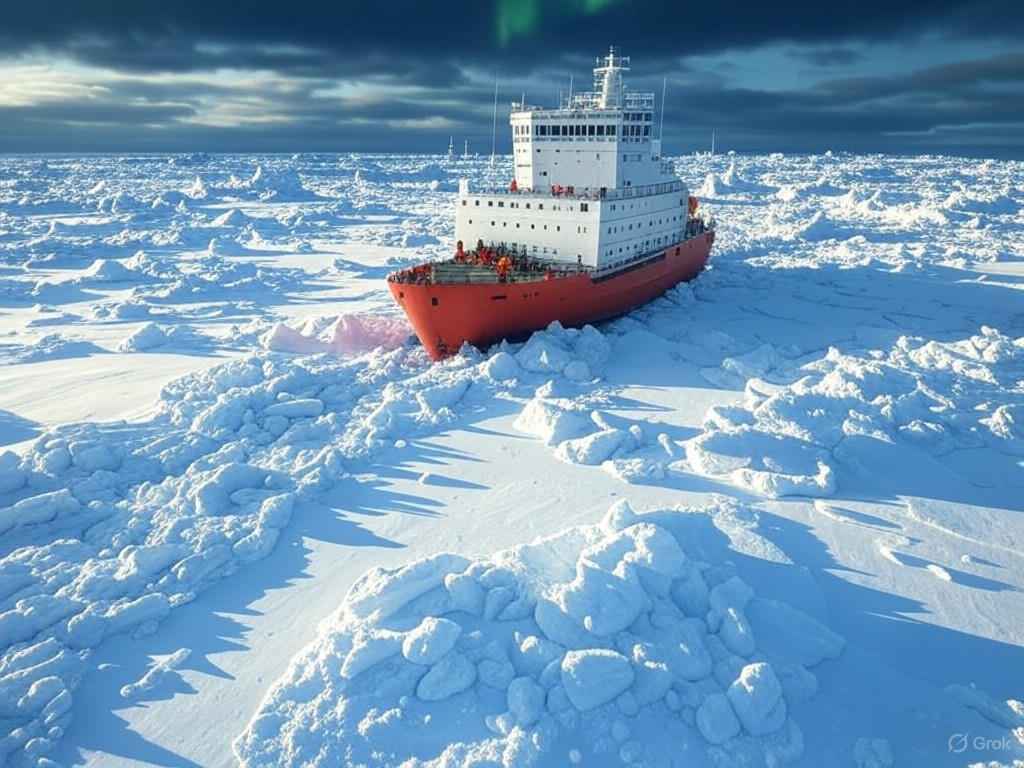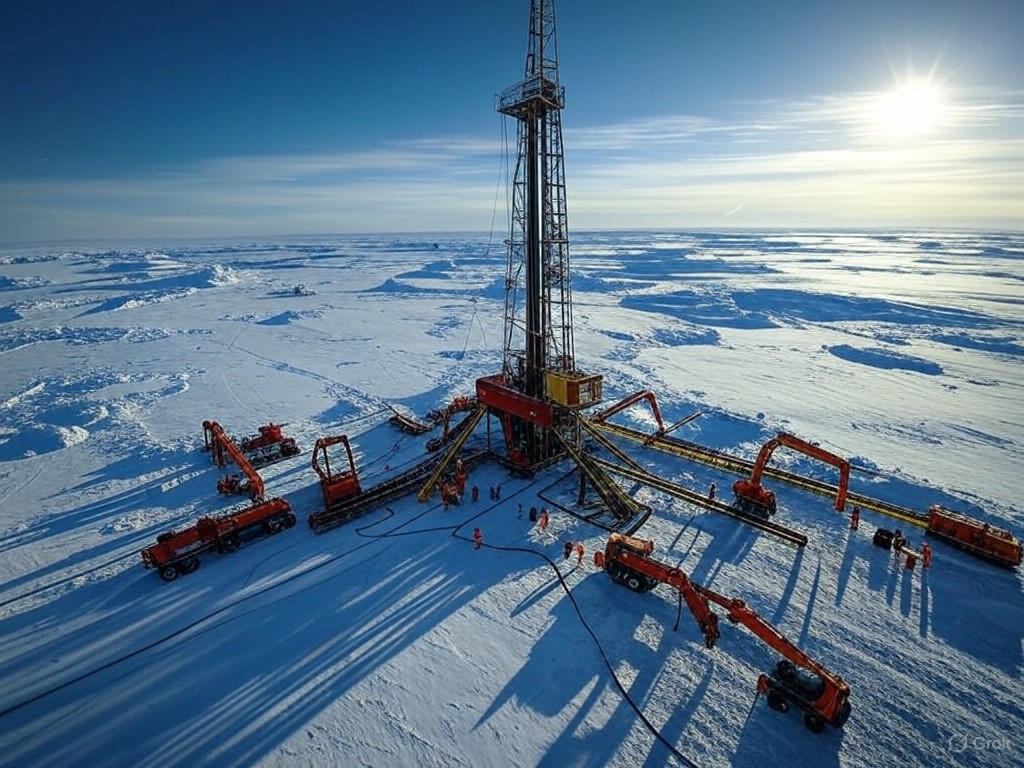Russia’s Arctic Ambitions: A New Cold War Frontier?
In the vast, icy expanse of the Arctic, where the sun dips below the horizon for months on end, nations are charting courses that could redefine global power dynamics. Russia, ever the bold protagonist in this frozen drama, is aggressively pursuing its Arctic resources with a mix of audacity and calculation. As Joanna Aucton, I observe this spectacle with a keen eye for the interplay of ambition and folly, much like the intricate social maneuvers of a Regency ballroom. Yet, beneath the glitter of potential wealth lies a web of geopolitical tensions that threaten to unsettle trade routes and climate policies worldwide. This push, driven by Moscow's unyielding quest for energy dominance, underscores the perils of unchecked state intervention while highlighting the virtues of free-market pragmatism and traditional strategic restraint.
Russia's maneuvers in the Arctic are not mere adventurism; they are a calculated bid to leverage the region's vast hydrocarbon reserves and mineral wealth amid a shifting global landscape. With estimates suggesting that the Arctic holds up to 13% of the world's undiscovered oil and 30% of its undiscovered natural gas, Moscow sees this as a lifeline for its economy, battered by sanctions and market fluctuations (Wall Street Journal, "Russia's Arctic Oil Rush Amid Global Tensions"). The strategy involves bolstering military presence, expanding infrastructure like the Northern Sea Route, and forging alliances with nations hungry for resources. This is no small endeavor: Russia's state-owned energy giants, such as Rosneft and Gazprom, are at the forefront, investing billions in drilling operations and icebreaker fleets to access these frozen treasures.

This image captures a Russian icebreaker, the Vostok, cutting through Arctic ice, emblematic of Moscow's determined yet risky pursuit of resource dominance in a region of delicate international balance.
The Analysis: Russia's Resource Ambitions and the Shadows of Geopolitics
At the heart of Russia's Arctic strategy is a blend of economic necessity and geopolitical posturing. The Kremlin views the Arctic as a key arena for reclaiming lost imperial prestige, much as one might view a faded noble house attempting to reclaim its estates through sheer willpower. By 2030, Russia aims to increase cargo traffic along the Northern Sea Route—a shortcut connecting Europe and Asia that could shave thousands of miles off traditional shipping paths—to levels that rival the Suez Canal. This push for resources is fueled by the promise of energy independence and export revenues, yet it escalates tensions with neighboring powers like the United States, Canada, and NATO allies, who eye these moves with suspicion.
Geopolitics in the Arctic is a high-stakes game, where overlapping territorial claims and military buildups could spark conflicts reminiscent of 19th-century great-power rivalries. Russia's deployment of advanced submarines and air defenses in the region, coupled with its 2014 annexation of Crimea as a precedent, signals a willingness to challenge the post-Cold War order (Foreign Affairs, "Moscow's Arctic Chessboard"). From a center-right perspective, this underscores the dangers of expansive government control over resources, which often leads to inefficiencies and international friction. Free markets thrive on competition and innovation, not on state monopolies that stifle global cooperation. Indeed, Russia's heavy-handed approach risks alienating potential partners, turning what could be a boon for worldwide energy markets into a flashpoint for discord.
Yet, the implications extend beyond mere saber-rattling. The Arctic's thawing ice, accelerated by climate change, opens new opportunities for trade routes but at a cost. As global temperatures rise, the Northern Sea Route could become a vital artery for commerce, potentially reducing shipping times and costs. However, Russia's dominance in this corridor raises questions about access and security for other nations, echoing the traditional value of open seas as a commons for all, not the private fiefdom of one power.
Evidence of Escalation: Resources, Climate, and Global Repercussions
The evidence of Russia's Arctic push is as chilling as the region itself. In recent years, Moscow has invested over $100 billion in Arctic infrastructure, including new ports and military bases, to extract oil and gas from fields like the Yamal Peninsula (Arctic Institute, "Russia's Resource Race in the North"). This extraction frenzy not only bolsters Russia's economy but also exacerbates climate change, as burning these fossil fuels contributes to greenhouse gas emissions. According to data from the Intergovernmental Panel on Climate Change, Arctic warming is occurring at twice the global rate, melting ice caps and releasing methane—a potent driver of further warming (IPCC Report Summary, "Arctic Amplification and Global Impacts").
Such developments have profound global implications. For trade routes, the Northern Sea Route promises efficiency, potentially slashing transit times from Rotterdam to Shanghai by 40%. Yet, Russia's control could lead to tolls, regulations, and even blockades, undermining the free-market principles that have long facilitated international trade. From a center-right lens, this highlights the need for limited government intervention: instead of relying on multilateral treaties that often devolve into bureaucratic quagmires, nations should pursue bilateral agreements that emphasize market access and mutual benefit.
On climate policies, Russia's strategy forces a reckoning. While environmental stewardship is a worthy pursuit, overzealous regulations from bodies like the United Nations could hamstring economic growth. A balanced approach would prioritize innovation in clean technologies, allowing market forces to drive solutions rather than imposing top-down mandates. For instance, the U.S. and its allies could counter Russia's moves by investing in alternative energy sources, fostering competition that rewards efficiency over state subsidies (Energy Information Administration, "Global Energy Outlook and Arctic Developments").

This depiction of an oil drilling platform in Russia's Yamal region illustrates the environmental trade-offs of resource extraction, where economic gains clash with the imperatives of climate stability.
The geopolitical ramifications are equally stark. Tensions have already manifested in joint military exercises by NATO members and increased surveillance in the Arctic Circle. If left unchecked, this could evolve into a new Cold War, diverting resources from productive endeavors to wasteful arms races. Traditional values of diplomacy and restraint, rooted in the stability of free societies, demand a measured response—one that favors economic leverage over military escalation.
Conclusion: Navigating the Icy Path Forward
As the Arctic's frozen veil lifts, revealing both opportunity and peril, Russia's strategy serves as a cautionary tale of ambition unchecked by prudence. The push for resources has undeniably escalated geopolitical tensions, reshaping trade routes and challenging climate policies in ways that demand vigilance. Yet, from a center-right perspective, the path forward lies not in expansive government interventions or international overreach but in embracing free-market dynamics and traditional alliances. By fostering innovation, securing open access to global waterways, and prioritizing energy diversification, nations can mitigate risks while harnessing the Arctic's potential for mutual prosperity.
In this narrative, Russia plays the role of the overreaching protagonist, whose bold strokes may yield short-term gains but invite long-term isolation. Let us, then, advocate for a world where competition is fair, governments are restrained, and values of liberty and enterprise prevail. As the ice melts, so too must the barriers to sensible, market-driven solutions.

